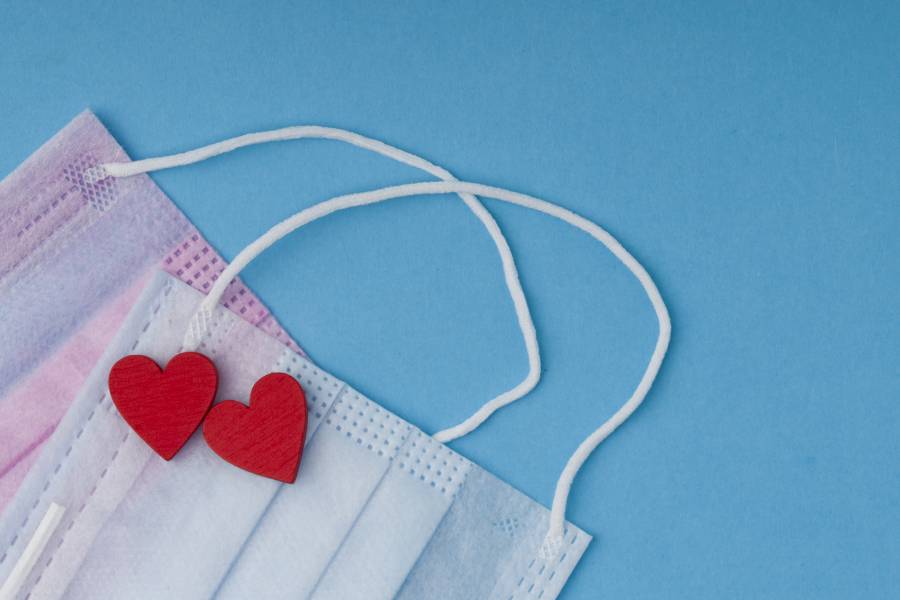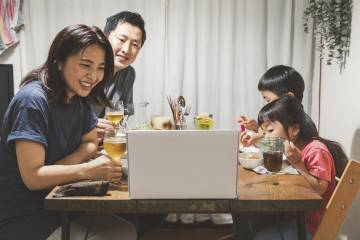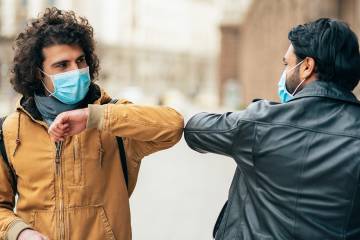Thirty-four-year-old Chicagoan Megan Sizoo adjusted to her new normal in the pandemic much like everyone else: stocking up on masks, maintaining social distance, and keeping most of her life close to home, including working remotely since March.
But some new rules she had to invent on her own: no hugs until the third date and no meeting with anyone who wasn't willing to start things outdoors, with a mask on—and absolutely no dating anyone who claimed COVID-19 was a hoax or the same as the seasonal flu.
"The thought of totally stopping dating didn't occur to me," she says via email. "It was hard enough living alone as a single woman in a pandemic."
Public health experts would not only sympathize, but find much to praise in her approach.
"Dating is very important, meeting people is very important—these aspects of our lives have to continue, but in a way that's safe," says Keri Althoff, an associate professor in the Department of Epidemiology at the Johns Hopkins Bloomberg School of Public Health.
In a time marked by fatigue stemming from constantly evaluating ever-changing risk levels, Althoff suggests having a predefined set of questions in place to make dating decisions easier. In collaboration with Elizabeth Stuart, a professor in the Bloomberg School's Department of Mental Health, she developed an assessment framework for families early in the pandemic, which she says also can be applied to dating. The goal for a single person should be to look for a partner who shares a similar perception of risk, as assessed by the framework. That helps avoid ambiguity, even if both people say they are "very careful."
For example, two prospective daters might both agree that masks and social distancing are important, but one of them might regularly shop inside crowded stores or go to the gym while the other never enters a public building. If they date and have any skin contact or speak without masks within six feet of one another for more than 15 minutes, the latter partner is taking on the first partner's significantly higher risk.
"This isn't about stigmatizing anyone's behavior; we should try to reserve judgement," Althoff says. "Whether you chose it or it just happens, you're carrying the other person's exposure for the next 14 days."
She suggests that single people make sure the person they plan to date is making choices similar to their own before they ramp up any interactions "because it's going to disrupt your life if you become ill with COVID." That could include as-yet unknown long-term effects of COVID-19 infection, she adds.
Still, the vaccine continues to roll out, and if we all work together to stop the spread, we may be back to a much more social late summer or fall, she says. "To the people in the dating world, I would say: Just hang on a bit longer!"
Laura Murray, a clinical psychologist and senior scientist in Mental Health, agrees that the most important consideration for single people in the pandemic is to assess their own values and comfort levels—before the date, not during it. "Number one is to figure out where you stand," Murray says. "Do I feel comfortable with intimacy during this time? What do I need? Am I willing to take risks?"
Then, she suggests discussing these values and dating decisions with a strong support group of friends. "You want people who will help you stand your ground," she says.
"Dating is already hard, it's dealing with a lot of awkward situations anyway, and now this raises the bar," Murray says. One positive? The extensive pre-date vetting required by safety-minded single people is likely to ensure they develop extensive skills in social emotional intelligence and communication. That will be valuable for the rest of their lives, whether talking to bosses, family, or in relationships, she says, while acknowledging that some people aren't interested in developing skills, they just want to date.
Megan Sizoo experienced this firsthand. Now in a relationship, she says early on in the pandemic she tried to weed people out, usually by text, before meeting with them. "I asked more personal and deal-breaker type questions," she says. Then she stood her ground: When someone she was seeing mentioned a bike ride that indicated he'd been on an undisclosed date with another person, she broke things off. Later, they reconnected and became more up-front with each other, eventually deciding to try dating again—but this time exclusively and with precautions they both agreed on, including his decision to spend a week in self-isolation after going to the emergency room for stitches.
With clear communication and expectations in place, the couple is still together. Sizoo credits her pandemic dating experience, at least in part, with this outcome.
This article originally appeared on the Expert Insights website of the Bloomberg School of Public Health. Amy Dusto is a freelance writer based in Chicago. Her work has appeared in Discovery News, Symmetry Magazine, and Johns Hopkins Arts & Sciences Magazine, among other publications.
Posted in Health, Student Life
Tagged epidemiology, mental health, coronavirus, covid-19










